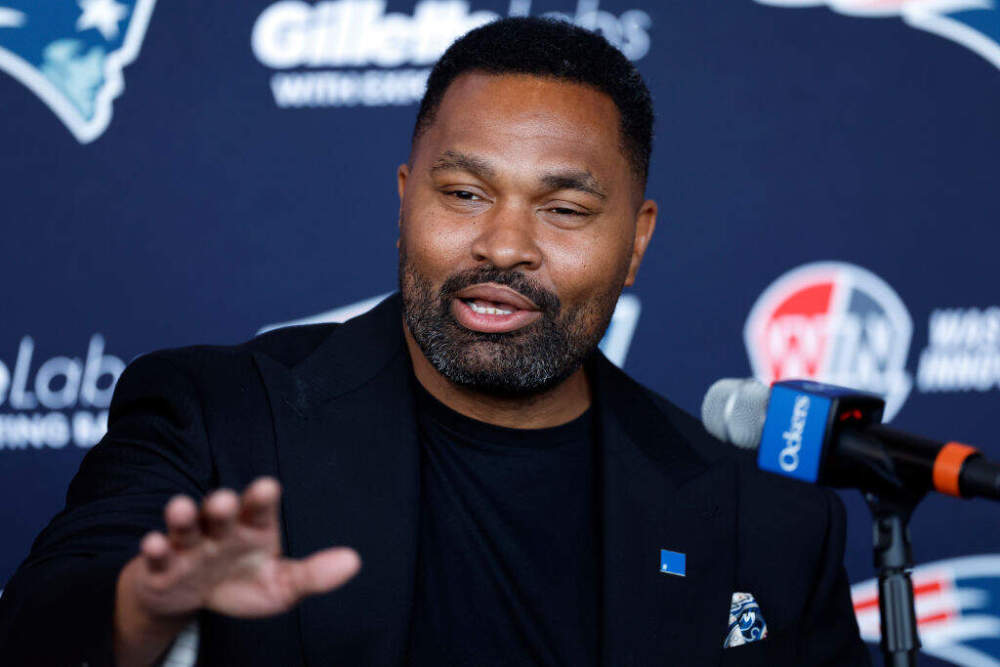Advertisement
Commentary
New Patriots coach Jerod Mayo sees in color. That's important

On January 17, Patriots owner Robert Kraft officially announced a move that would change the future of his franchise, anointing Jerod Mayo to be Bill Belichick's successor as the Patriots head coach.
Not only is Mayo a former Patriots captain and Super Bowl champion, he’s the first Black head coach in Patriots history. Whether you care about football or not, that’s a monumental fact.
A year ago, while covering the Patriots for WEEI, I was already preparing for this moment and considering its historic significance. Kraft, who has been outspoken about health equity and diversity initiatives, is certainly aware of its importance. So I found it off-putting when, in response to a question about Mayo’s race and the magnitude of his ascent, Kraft was evasive:
“I'm really colorblind in terms of, I know what I feel like on Sunday when we lose … I want to get the best people I can get. I chose the best head coach for this organization. He happens to be a man of color. But I chose him because I believe he's best to do the job.”
Instead of spiking the ball on his history-making hire, Kraft played things safe.
In particular, his use of the word “colorblind” triggered a visceral response in me. While I don't speak for all Black people, I know quite a few who, like me, think “colorblindness” suggests an inability or unwillingness to reckon with the inequitable world as it is — not a way to make things more equitable.
Mayo, however, took the same question head-on:
“What I will say, though, is I do see color because I believe if you don’t see color, you can’t see racism … It does matter so we can try to fix the problem that we all know we have.”
Now that made me sit up in my chair.
Of course, Mayo isn’t saying race is the only thing that matters in coaching football. But naming the elephant in the room sits in stark contrast to what others in his position have done.
When posed with similar queries, other head coaches of color in the football world, like Tampa Bay’s Todd Bowles and Michigan’s Sherrone Moore, have demurred, opting to blend in (as much as possible) rather than purposefully stand out.
“We coach ball, we don't look at color,” Bowles said last season when asked about coaching against the few other Black coaches in the league.
Moore, who was just named the first Black head coach in the University of Michigan’s history, claimed “I don’t see color” when asked about racial stereotypes in football.
As punchless as those remarks seem, it's not hard to understand why they’d prefer not to talk about race if they can avoid doing so. It singles them out, reminds them how rare they are and how many people don’t believe they belong — whether that’s the intent of the question or not.
A report commissioned by the NFL stated that 54% of NFL players in 2023 were Black. (About 24% of NFL players were white by comparison.)
Of the 32 head coaches in the league, though, only seven are Black or have African American heritage (Mike McDaniel is mixed race). As of this writing, only 24 Black men have occupied a non-interim head-coaching position since 1990, and 11 teams still have never had a Black head coach according to USA TODAY.
[It] certainly strains credulity that less than 30 Black men have been qualified to be a NFL head coach since 1970.
I’m not suggesting that people should be hired to positions based on their race alone. But it certainly strains credulity that less than 30 Black men have been qualified to be an NFL head coach since 1970.
Research from the Washington Post also shows Black coaches are four times more likely than white coaches to be fired after leading their teams to winning seasons. What’s more: there are no Black majority owners in the league and only two non-white owners — Shad Khan (a Pakistani-American) of Jacksonville and Kim Pegula (an Asian-American) of Buffalo — of any sort. Much like the larger corporate world, the C-suite in NFL buildings is hardly representative.
Kraft hiring Mayo is admirable given all the prior context. That said, the move already has plenty of detractors. Some believe Mayo’s experience is insufficient. Others wish the team had hired former Tennessee Titans head coach Mike Vrabel — a former teammate of Mayo’s on the Patriots. Or a more offensive-minded head coach, specifically geared toward coaching the team’s quarterbacks.
Mayo’s comments on race have thrown additional fuel to the fire. He’s already being slammed by right-wing pundits as a “woke” coach whose mere acknowledgment of race means he intends to judge players by their skin.
But despite the criticism and pressure, Mayo isn’t changing course. At the same presser announcing his appointment, Mayo teased Kraft about his inability to pronounce Mayo’s brother’s name: “It’s one of those Black names. I’ll help you with that,” Mayo joked. He then quipped to former Patriots teammate Devin McCourty that he planned to “turn up” after the presser.
Mayo’s presence in a head-coaching job challenges the NFL’s status quo, regardless of what he eventually does in the role. His rebuttal of colorblindness goes even further.
The prevailing assumption for advocates of colorblindness is that simply refusing to see color will eliminate racism. If you don’t acknowledge race, it doesn't matter. Except that it does, and it always has here in America. To say otherwise isn’t colorblind; it’s just choosing not to see.
I do see color because I believe if you don’t see color, you can’t see racism … It does matter so we can try to fix the problem that we all know we have.
Jerod Mayo
When Mayo says he sees color, that’s important. There’s a shared experience he can draw on with his Black players, and he’s demonstrated that he can be a leader in a locker room with people of all backgrounds. Seeing color means he sees himself, his players, his bosses and everyone around him for who they are in their entirety.
That’s how you relate to and get the most out of not just the 53 men on an NFL roster, but the coaching staff you assemble — all things people criticized Bill Belichick for being unable to do in his later years.
Rather than searching for the comfort of homogeneity by trying to minimize himself and his experience, Mayo has chosen to embrace the discomfort of difference — to be unapologetically himself. Unapologetically Black. He’s not demanding conformity to the “Patriot Way”: this is a new way for a new age.
What does it mean for him to be the first Black head coach in Patriots history? Both for Mayo and for a franchise entering a new age, it could mean a lot — in the best way.
